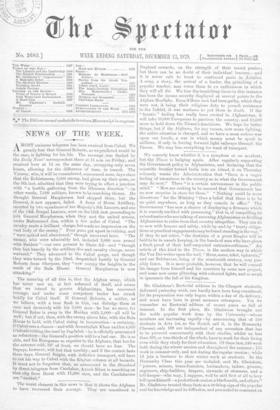Mr. Gladstone's Rectorial address to the Glasgow students, delivered yesterday
week, can hardly haVe been long considered, for its preparation was only begun within a day of its delivery, and must have been in great measure extempore. Yet we remember no Rectorial address of recent years so full of interest. Ia the first place, Mr. Gladstone brought out the noble popular work done by the University—whose numbers are increasing rapidly—by announcing that of 590 students in Arta (or, as the Scotch call it, in the Humanity Classes), only 199 are independent of any avocation that has to be pursued concurrently with their studies, whilst no less than 391, or two-thirds of the whole, have to work for their living even while they study for their education, Of these last, 240 work both during the winter session and throughout the summer; 135 work in summer only, and not during the regular session; while 16 join a business to their winter work as students. In the Humanity Class this year are included, said Mr. Gladstone, "joiners, miners, brass-founders, bootmakers, tailors, grocers, engineers, ship-builders, drapers, stewards of steamers, and a toll-keeper—who may, I suppose, well be said first of all to levy toll upon himself—a pocketbook-maker, a blacksmith, and others." Mr. Gladstone treated these facts as a striking sign of the popular zeal for knowledge and its diffusion, and proceeded to comment on the special function of a University in redressing the balance between the growing wealth and luxury of the new era, and those higher wants of man to which wealth and luxury can minister comparatively little. This it would do, ho said, for the law students, by teaching them to temper a rather one-sided profession with more liberal studies ; for medical men, by helping them to see how much more every day, with growing culture, the study of the mind helps the study of the body ; for theologians, by finding for them the answer to that sus- picion, at present so wide-spread in the world, that divinity is an unreal region, in which no solid ground can be main- tained, After dealing at length with a very interesting part of this subject, to which we have drawn attention elsewhere, Mr. Gladstone concluded by a fine plea for history, as the one study in which chiefly the moral judgment is educated to greater impartiality, as a consequence of the effort it requires to measure men by the standard of the worlt in which they actually lived, and not by our own standard of living.







































 Previous page
Previous page